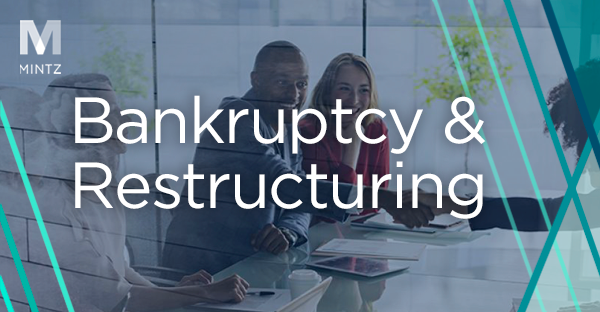Consolidated Appropriations Act of 2021 Amends Bankruptcy CodePart 3: Congress Gives Suppliers and Landlords a Shiny New Arrow in their Quiver to Challenge Preference Actions
As discussed in previous posts, the Consolidated Appropriations Act of 2021 (the “Act”) was signed into law on December 27, 2020, largely to address the harsh economic impact of the COVID-19 pandemic. For bankruptcy litigators – or any business which has been frustrated to receive a demand letter after one of its customers filed bankruptcy – one particular amendment stands out in the sprawling 5,593-page bill. The Act amended Section 547 of the Bankruptcy Code to provide suppliers and landlords with an additional potential challenge to actions brought to “claw back” payments made by a debtor in the 90 days preceding bankruptcy.
Generally speaking, Section 547 of the Bankruptcy Code enables a bankruptcy trustee (or debtor-in-possession) to claw back certain payments made by a debtor to its creditors in the 90 days preceding a bankruptcy case, unless the creditor can establish one of the statutory defenses, including: (1) the payment was made at the same time as the creditor provided goods or services to the debtor (i.e., a contemporaneous exchange); (2) the payment was made in the ordinary course of business (i.e., in the same manner as payments were made before the debtor experienced financial distress) or according to ordinary business terms; or (3) the creditor provided additional goods and services to the debtor on credit after receiving the payment. The purpose of Section 547 is to prevent creditors from racing to dismantle a financially distressed company, and more importantly, to ensure certain creditors are not receiving preferential treatment by the company while others are left holding the bag.
The Act added a new subsection 547(j) to the Bankruptcy Code, generally providing that a trustee (or debtor-in-possession) may not avoid and recover as a preferential transfer:
- A payment of arrearages under a commercial real property lease made “in connection with” an agreement or arrangement between the debtor and its landlord entered into on or after March 13, 2020 (the date former President Trump declared a national emergency due to the COVID-19 pandemic) to defer or postpone payment; or
- A payment of past due amounts made to a supplier of goods and services “in connection with” an agreement or arrangement between the debtor and the supplier entered into on or after March 13, 2020.
This new provision, which sunsets on December 27, 2022, is subject to certain limitations, including:
- The payment cannot exceed the amount that was otherwise due under the lease with the landlord or executory contract with the supplier before March 13, 2020; and
- The payment cannot include fees, penalties, or interest for deferred payments originally due prior to March 13, 2020.
The policy objectives underlying new Section 547(j) seem apparent: (i) ensuring landlords and suppliers are not penalized for accepting deferred payments (out of the ordinary course) under arrangements they have entered into with businesses hit hard by the global pandemic, and (ii) incentivizing landlords and suppliers to explore financial accommodations with their distressed counterparties going forward, instead of exercising default and termination rights under existing agreements. While salutary, these policy objectives are, to some extent, in conflict with Section 547’s general purpose of ensuring equal distributions for all creditors of businesses in distress. Notably, the statute does not protect certain types of creditors – such as lenders – even though an agreement by any creditor to accept a deferred payment would, presumably, benefit a distressed business just as much as a supplier’s or landlord’s agreement to do so.
In any event, the actual language adopted by Congress leaves plenty of room for interpretation. For instance, a payment to a supplier must be made pursuant to an “executory contract.” But it is unclear whether the contract need still be “executory” on the petition date. If the supplier accepts an otherwise exempt deferred payment and then terminates the contract prior to bankruptcy, does the supplier still have the benefit of Section 547(j)?
In addition, it is likely the courts will face questions regarding what constitutes a deferral “agreement” or “arrangement” for purposes of the statute, and whether such agreement or arrangement qualifies for protection if deferring or postponing payment of arrearages is part of a larger agreement to restructure the parties’ business relationship involving various forms of consideration. Finally, the language of the statute may leave room for parties to potentially game the system. For instance, Section 547(j) is an exception from the avoidance power under 547(b), not a defense, meaning payments to insider landlords and suppliers during the year preceding the bankruptcy appear to also be subject to the exemption. Thus, affiliated companies with intercompany debts may be incentivized to enter into friendly agreements to defer payments for the purpose of ensuring catch-up payments are exempted from avoidance.
Only time (and the courts) will tell whether this new provision will accomplish the intended Congressional objectives, and what avenues parties may exploit to take advantage of this otherwise well-intentioned response to the fallout from the coronavirus pandemic. In the meantime, landlords and suppliers who have deferred payments during the pandemic should ensure they document these deferrals – and avoid charging interest or penalties prohibited by statute – in order to take advantage of Section 547(j) should their tenant or customer file bankruptcy.
Authors

Joseph Dunn


